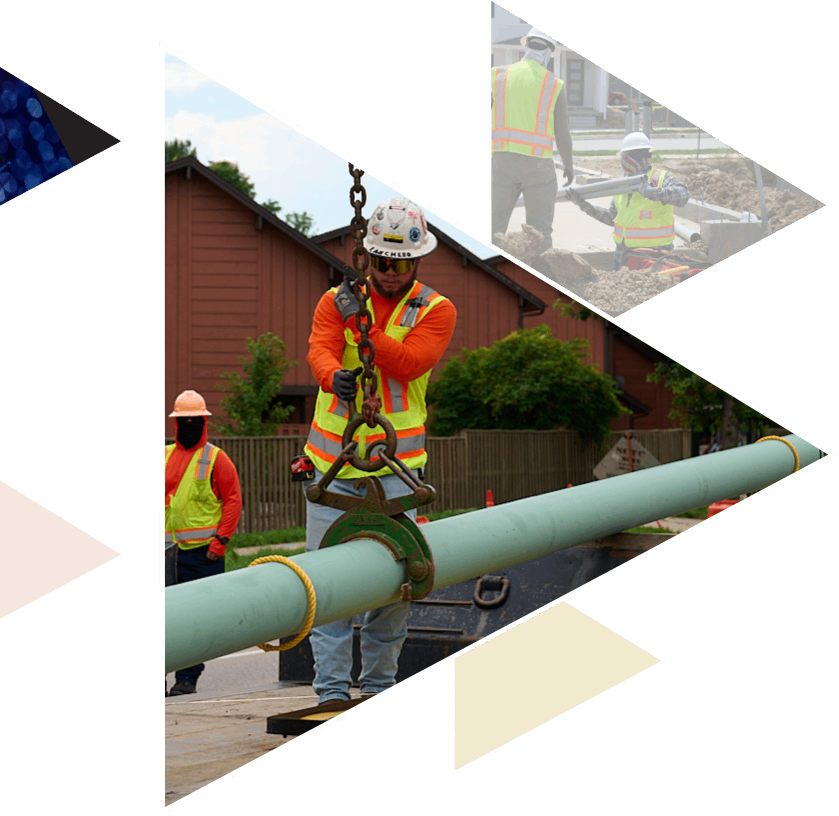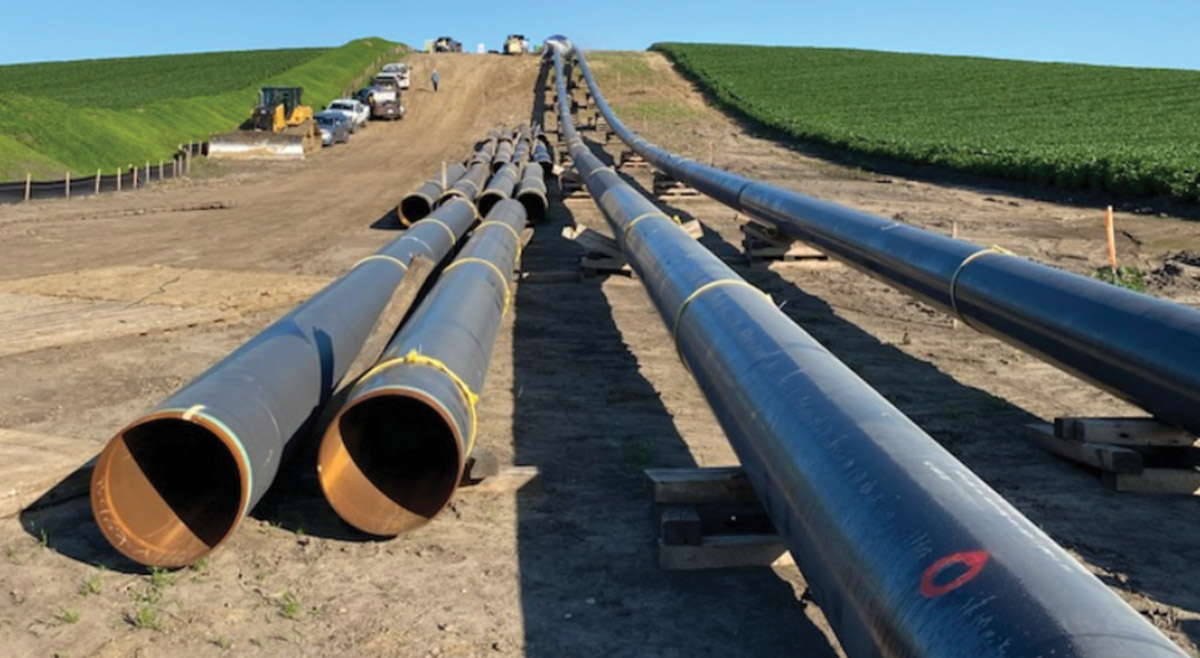The Role of Pipeline Construction Services in Modern Infrastructure
Exploring the most recent Developments in Pipeline Construction Services for Modern Projects
The Pipeline Construction industry is undertaking significant changes. Innovations such as clever products and robotics are improving typical practices. These developments assure to enhance effectiveness and security. Additionally, AI technologies are boosting project administration abilities. As these elements assemble, they question concerning their long-lasting effect on sustainability and expense. Comprehending these advancements is crucial for stakeholders seeking to browse this evolving landscape. What effects do they hold for future projects?
The Surge of Smart Products in Pipeline Construction
As the need for extra reliable and sustainable Pipeline systems enhances, the combination of clever materials has actually emerged as a transformative option in Pipeline Construction. These sophisticated products possess one-of-a-kind homes that improve the performance and durability of pipes. For circumstances, self-healing polymers can immediately repair small leaks, significantly lowering upkeep costs and downtime. Furthermore, materials embedded with sensors can keep track of architectural honesty and environmental conditions, enabling real-time information collection and analysis.
Clever products are frequently light-weight and corrosion-resistant, which not just streamlines installment but additionally prolongs the life-span of the systems. Their adaptability makes it possible for pipelines to stand up to extreme ecological problems, advertising safety and dependability. As sectors progressively prioritize sustainability, using environment-friendly clever materials adds to minimized ecological impact. Generally, the rise of smart materials notes a notable shift in Pipeline Construction, leading the means for innovative solutions to meet modern infrastructure requirements.
Improvements in Robotics for Installment and Upkeep
The combination of smart materials in Pipeline Construction is matched by developments in robotics, which are reinventing installment and maintenance processes. Robot modern technologies, such as automated welding systems and drones, boost effectiveness and precision, decreasing human mistake and minimizing safety and security threats. These robots can operate in tough settings, making sure that installments are performed in dangerous or remote areas without putting workers in danger.
Moreover, robot assessment devices geared up with innovative sensing units provide real-time data on Pipeline integrity, permitting proactive upkeep. They can identify leaks or structural weak points, enabling prompt interventions that prolong the life-span of Pipeline systems. The use of robotics not just speeds up the Construction timeline but likewise optimizes source allotment, causing cost savings. As these innovations remain to develop, they are established to play an essential function fit the future of Pipeline Construction, ensuring reliability and sustainability in infrastructure development.
AI-Driven Project Monitoring Equipment Changing Workflow
AI-driven job monitoring devices are reshaping operations in Pipeline Construction by boosting decision-making procedures with improved accessibility to real-time data analytics. These devices enable groups to react promptly to job developments, thus boosting efficiency. Additionally, structured interaction channels foster cooperation among stakeholders, better optimizing project end results.
Enhanced Decision-Making Procedures

Real-Time Information Analytics
Using real-time information analytics, modern project monitoring devices revolutionize workflow in Pipeline Construction. These advanced tools leverage man-made knowledge to supply instantaneous understandings right into task performance, source appropriation, and possible risks. By continually keeping an eye on essential efficiency indications, teams can swiftly adjust to changing problems, enhancing labor and materials use. The assimilation of real-time information permits even more educated decision-making, reducing delays and reducing expenses. In enhancement, predictive analytics can recognize patterns and projection obstacles prior to they escalate, enhancing general project effectiveness. Therefore, Pipeline Construction business that adopt these AI-driven tools can boost job timelines and results, guaranteeing they stay affordable in a significantly complex sector landscape. This advancement marks a considerable shift towards data-centric monitoring techniques.
Structured Interaction Networks
Efficient communication is paramount in Pipeline Construction, where numerous stakeholders have to work together effortlessly to ensure task success. The intro of AI-driven job monitoring tools has actually changed communication channels within the sector. These tools help with real-time info sharing, allowing teams to access updates, share papers, and track development efficiently. By automating regular jobs and supplying a centralized system for interaction, these developments eliminate misunderstandings and minimize hold-ups. Enhanced presence right into job timelines and resource allotment promotes accountability amongst staff member. In addition, AI analytics can determine prospective communication voids, making certain aggressive problem-solving. Inevitably, structured communication networks not only improve operations however likewise raise total project efficiency, enabling Pipeline Construction companies to satisfy modern-day needs successfully.
Boosted Security Procedures Via Modern Technology Integration
The combination of modern technology in Pipeline Construction has actually led to enhanced safety protocols. Real-time tracking systems, wearable safety devices, and automated risk analyses are now crucial parts in decreasing hazards on job sites. These innovations not only boost employee safety and security yet likewise enhance compliance with industry regulations.
Real-Time Monitoring Systems
How can real-time monitoring systems change Pipeline Construction safety protocols? By integrating innovative modern technology, these systems provide continual security of Construction activities, making sure immediate discovery of possible dangers. Sensors and video cameras can keep an eye on ecological problems, equipment efficiency, and labor force movements, supplying critical information in genuine time. This proactive strategy enables project supervisors to determine risks prior to they rise, substantially boosting safety steps on-site. On top of that, real-time surveillance helps with compliance with regulatory demands, ensuring that safety criteria are met regularly. The capability to evaluate data immediately supports enlightened decision-making, allowing prompt interventions. Consequently, Pipeline Construction jobs can operate extra effectively while safeguarding the health of workers and decreasing mishaps, thereby revolutionizing the market's safety landscape.
Wearable Safety Devices
Regularly, wearable security tools are being incorporated right into Pipeline Construction to improve safety and security protocols. These ingenious devices, including wise headgears, vests, and wristbands, are developed to monitor worker wellness and ecological problems in real-time. Equipped with sensors, these tools can find risks such as toxic gas look at more info direct exposure, excessive warm, or high sound levels, providing prompt notifies to employees and supervisors. Additionally, wearable modern technology often includes general practitioner monitoring features, enabling for reliable area monitoring of workers on-site. This capacity not just help in fast response during emergency situations yet additionally enhances general task monitoring. By prioritizing employee safety via technology combination, Pipeline Construction firms are making significant strides in reducing mishaps and promoting a society of security within the market.

Automated Risk Analyses
While conventional danger assessments usually rely on hands-on analyses, the integration of automated danger analysis technologies is transforming security methods in Pipeline Construction. These advanced systems leverage data analytics, expert system, and artificial intelligence to recognize potential risks a lot more properly and effectively. By continuously checking environmental conditions, devices condition, and employee actions, automated analyses supply real-time understandings that boost decision-making. This proactive approach reduces the possibility of mishaps and improves compliance with safety policies. Furthermore, automated risk assessments can be updated instantaneously, making certain that all stakeholders have accessibility to the most up to date information. Consequently, Pipeline Construction tasks gain from a safer work atmosphere, decreasing disturbances and cultivating a society of safety and security with modern technology assimilation.
Lasting Practices in Pipeline Construction
As the need for power infrastructure rises, the Pipeline Construction sector progressively prioritizes lasting methods that minimize ecological effect. Business are embracing green products and sophisticated Construction techniques to decrease their carbon footprint. The use of trenchless modern technology permits for Pipeline installment with very little disruption to the surrounding atmosphere, reducing and preserving all-natural environments soil disintegration.
Maintaining In addition, the application of renewable power resources, such as solar or wind, to power Construction tasks is gaining traction. This shift not only reduces dependence on fossil gas but additionally boosts the overall sustainability of Pipeline projects. Effective waste management methods, consisting of reusing and recycling products, are becoming requirement in the market.
Real-Time Monitoring and Predictive Upkeep Solutions
The change towards sustainable methods in Pipeline Construction has paved the way for the integration of real-time monitoring and predictive upkeep remedies. These modern technologies leverage progressed sensing units and information analytics to constantly examine Pipeline honesty and functional performance. By accumulating information in real time, operators can identify anomalies such as leaks or pressure declines prior to they escalate right into major concerns. This aggressive approach not only reduces environmental risks but likewise decreases downtime and maintenance expenses.
Predictive maintenance uses algorithms useful source to forecast possible failures based upon historic data and existing efficiency metrics. This enables prompt treatments, optimizing upkeep routines and resource appropriation. Generally, real-time monitoring and anticipating maintenance remedies represent a significant innovation in Pipeline Construction, improving security and integrity while supporting sustainability objectives. As sectors continue to accept these technologies, the operational landscape of Pipeline monitoring is readied to develop substantially, making certain long-term stability and effectiveness.
The Duty of Drones in Checking and Examination
Drones have become transformative devices in the checking and inspection of pipes, offering boosted effectiveness and precision. Their ability to record high-resolution images and video clips from various angles enables extensive analyses of Pipeline integrity without taking the chance of human safety. Outfitted with advanced sensors and thermal imaging capabilities, drones can discover leakages, corrosion, and structural abnormalities that may not be noticeable to the naked eye.
Moreover, the implementation of drones significantly reduces assessment time, enabling quicker decision-making for repair and maintenance. This efficiency equates to set you back savings and very little disturbance to surrounding settings. Drones can also access hard-to-reach areas, such as rugged surfaces or raised frameworks, even more expanding the range of assessments.
As the Pipeline market continues to embrace technological advancements, the integration of drones into surveying and assessment processes is expected to grow, setting new standards for operational quality and safety and security in Pipeline Construction solutions.
Often Asked Concerns
What Are the Costs Connected With Modern Pipeline Construction Innovations?
The costs associated with modern Pipeline Construction developments typically include sophisticated materials, specialized labor, and sophisticated innovation. These factors contribute to greater initial financial investment, however can cause a knockout post lasting cost savings via enhanced effectiveness and lowered maintenance requirements.
Just How Do Regulative Adjustments Impact Pipeline Construction Technologies?
Regulatory modifications substantially impact Pipeline Construction modern technologies by requiring the adoption of safer, extra reliable approaches. Conformity needs frequently drive development, causing improvements in products, style, and Construction methods that improve general job sustainability and safety and security.
What Abilities Are Needed for Careers in Advanced Pipeline Construction?

Careers in sophisticated Pipeline Construction call for know-how in design principles, job administration, safety and security protocols, and ecological guidelines. In addition, skills in innovation assimilation, teamwork, and analytical are necessary for traversing the complexities of modern-day framework tasks.
Just How Can Companies Make Certain Conformity With Environmental Criteria?
To guarantee conformity with environmental criteria, firms should apply extensive training programs, perform regular audits, and embrace finest methods in sustainability. Involving with stakeholders and checking governing adjustments additionally enhances their commitment to environmental stewardship.

What Are the Secret Challenges Encountering Pipeline Construction Today?
The vital challenges encountering Pipeline Construction today consist of regulative conformity, environmental issues, fluctuating product prices, labor scarcities, and the requirement for advanced modern technology combination (Pipeline Construction Services). These elements complicate task timelines and total performance in the industry
As the demand for much more reliable and sustainable Pipeline systems enhances, the integration of wise products has actually emerged as a transformative remedy in Pipeline Construction. AI-driven task administration tools are reshaping process in Pipeline Construction by improving decision-making procedures via improved access to real-time data analytics. While project administration in Pipeline Construction has actually commonly relied on manual procedures, the assimilation of innovative devices considerably boosts decision-making abilities. Using real-time information analytics, contemporary job monitoring tools change operations in Pipeline Construction. Professions in sophisticated Pipeline Construction need experience in design concepts, task administration, security procedures, and environmental policies.